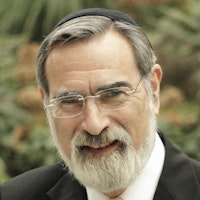The Space We Create
Topic: Belief & Faith
If we listen, God is closer to us than we are to ourselves. If we do not, He is further away than the most distant star. Religion is an elaborate discipline of paying attention. Faith is the space we create for God.
Jonathan Henry Sacks, Baron Sacks, was born on March 8, 1948, in Lambeth, London. He became a notable British Orthodox rabbi, philosopher, theologian, author, and politician. From 1991 to 2013, he served as the Chief Rabbi of the United Hebrew Congregations of the Commonwealth, playing a pivotal role in guiding and representing Jewish communities across the region.
Beyond his leadership in the Jewish community, Sacks was deeply passionate about character education, morality, and the importance of family. He frequently emphasized the role of ethical teachings in forming well-rounded individuals and believed in the necessity of strong family bonds for a stable society. An accomplished author, his books often explored the intersections of faith, morality, and contemporary challenges, aiming to make religious insights relevant to a wide audience. These works not only resonated within religious circles but also found acclaim in academic and political spheres due to their timely and profound insights.
Sacks passed away on November 7, 2020, in London. His legacy, marked by interfaith dialogue, advocacy for character education, and a steadfast commitment to the Jewish community, continues to inspire many. He is survived by his wife, Elaine Taylor Sacks, whom he married in 1970.
Sacks, Jonathan. "Where we let Him in." Celebrating Life. Continuum, 2002. 83. Print.

Jonathan Sacks
Theme: Belief and Faith


Commentary On This Passage By Jonathan Sacks [Short Commentary]
Commentary On This Passage By Jonathan Sacks [Longer Commentary]
Jonathan Sacks, Where we let Him in [Excerpts]
Resources
Related Quotes
Copyright © 2017 – 2025 LuminaryQuotes.com About Us